- Home
- Linda Lael Miller
A Wanted Man Page 16
A Wanted Man Read online
Page 16
So Lark followed Mrs. Porter into her kitchen and resigned herself to sitting down and sipping tea. This was inordinately difficult, since she was besieged by a strange, urgent sense that she needed to prepare for some impending crisis.
Mrs. Porter brought the teapot and the usual elegant cups and saucers to the table. Mai Lee was out on some errand, and they had the place to themselves, though Mr. Porter's coat, hanging on one of the pegs by the door, neatly brushed and aired, as though he might appear and put it on at any moment, belied the fact.
"Did you speak to Lydia?" the landlady asked, standing to pour tea for both of them and then sitting down. "About Nell Baker's coming for her, I mean?"
Lark sighed. Toyed with the handle of her teacup. "I asked her if she knew her aunt—though I didn't say the woman would be on her way to Stone Creek to fetch her as soon as there's a thaw—and she said she'd never met her. Apparently, Lydia's father and Miss Baker corresponded."
"What kind of person do you suppose she is?" Mrs. Porter fretted.
"I wish I knew," Lark said. Given her druthers, she would have raised Lydia herself, but Miss Baker was a blood relation, the child's maternal aunt, and as such she would have a legal advantage. "She can't be worse than Mrs. Fairmont."
"Mabel Fairmont," Mrs. Porter said, "is nothing but a trollop."
"Was it—" Lark paused, bit her lower lip, then made herself ask the question, well aware that contained an implicit accusation. "Was it common knowledge in Stone Creek that Lydia was living in squalor?"
Mrs. Porter straightened her spine, and her gaze was direct. "Poverty is not unusual around here," she said. "I'm sure you've noticed that, even though you've been a member of our community for a relatively short time. Some of the children in your school don't have enough to eat, nor shoes or coats, either. We do what we can to help, people like the O'Ballivans and Major Black-stone—and me. But the need is very severe, and then there's the matter of pride. Most of these little ones would rather starve and go barefoot year-round than accept charity."
"I really didn't mean to imply—"
The landlady softened. Patted Lark's hand. "I know," she said. Then, after a pause, she went on. "I've noticed the quality of your clothes, Lark. Even the banker's wife doesn't have such fine things, nor Maddie O'Ballivan, either, and Sam is wealthier than most people think and generous with his wife. Rooming here, living as you do, well—"
Lark resisted an urge to bolt from her chair and flee, thereby forcing an immediate end to the conversation. She didn't, though, because Mrs. Porter, for all her little prejudices and intrusive ways, had been kind, taking Lark in as a boarder without references, seeing that the school board provided her with lunches she couldn't afford to provide for herself, and now even providing sanctuary for Lydia.
Wherever she went, and whatever happened to her in the uncertain future, Lark knew she would always be unceasingly grateful to Mrs. Porter for being so generous and helpful. Lark wouldn't have had the first idea what to do if her landlady had turned Lydia away. Tears burned behind her eyes, just to think of the desperation she would have felt and what might have happened to the child.
"There, now," Mrs. Porter said, probably misreading the expression on Lark's face. "You know I hate to pry—" at this, Lark had to hide a smile "—but it's obvious I've struck a nerve. Who are you, Lark? Truly? And what are you doing in Stone Creek, of all places, when you so clearly belong in Boston or Philadelphia or some other fancy city?"
Lark wanted to answer those questions. She yearned to. But she didn't dare. Her situation was simply too precarious and so was Lydia's, at least until Nell Baker arrived. "I wish I could tell you," she said, for that was the best she could do.
To her utter surprise, Mrs. Porter subsided. She'd been leaning forward, watching Lark's face avidly. Now she sat back and sighed delicately. "Perhaps one day you'll be able to confide in me. I do know this much about you, though—you are a good person, Lark Morgan. If you weren't, you wouldn't have stood by that poor little Fairmont girl the way you have."
"Thank you," Lark said quietly.
There was a brief, tremulous silence.
Then, glancing at Mr. Porter's coat and the date circled in red on the calendar, Lark said, "There's a story behind your husband's absence, isn't there?"
"I wish I could tell you," Mrs. Porter said, and though she'd tossed Lark's own words back at her, there was no flippancy in her tone or manner. Instead, she looked wistful, as though she truly would like to explain.
Secrets, Lark thought. We all have them.
She certainly did.
Mrs. Porter did.
And so did Rowdy Rhodes. She couldn't afford to forget that, not for a moment, but it was so perilously easy to forget. Especially when he kissed her.
By the time Sam O'Ballivan left the marshal's office, having conveyed a message from his wife that Rowdy ought to come to supper at their place tomorrow night, along with Lark Morgan, provided the thaw came, of course, Rowdy was practically sweating blood.
He and Sam had made plans to ride out for Flagstaff as early as Sunday morning, to meet up with the converging rangers, and while that was a prospect Rowdy dreaded, it had been nothing compared to his fear that Pappy might stroll into the jailhouse while Sam was there. He'd lived under an alias for a long time, Pappy had, but he was still Payton Yarbro, from the top of his obstinate head right down to the soles of his feet. He'd fooled a lot of people in his time, including himself, but fooling Sam O'Ballivan, now, that was something else again.
"Where's Pa?" Rowdy asked Gideon, who had been making a simple pot of coffee the whole time Sam was in the office.
"Hiding out in the lean-to," Gideon said, looking a little shame-faced to say it. Though he didn't have the time or inclination to pursue the thought just then, Rowdy wondered what it had been like for Gideon, growing up with Pa and Ruby.
Had "Jack Payton" been a different sort of father than Payton Yarbro?
Rowdy sure as hell hoped so.
Gideon moved to warm his hands at the stove, probably more because he was nervous than cold. "He said to let him know when O'Ballivan was gone. Pa, I mean."
"Let him sit in the lean-to awhile," Rowdy said, getting his mug off the desk and helping himself to some of Gideon's coffee. "A little reflection on his ways might do him some good."
Hesitantly Gideon grinned. "You're taking Lark— Miss Morgan—to supper at the O'Ballivans' tomorrow night?"
"If the roads are clear," Rowdy said, after a restorative sip of very hot coffee. "And if she's willing to leave Lydia for that long. There are a whole lot of ifs here, Gideon."
"You like her," Gideon said, still grinning.
"Of course I like her," Rowdy replied, after more coffee. "She's a nice person."
Gideon's eyes glowed, and Rowdy would have bet he was wishing he was older, so he might pursue Lark himself. "You're taking her to the O'Ballivans for supper," he repeated, good-naturedly stubborn.
"It's not like it sounds," Rowdy argued casually. "We're both heading to the same place, so it makes sense to travel together." He thought of the dance coming up Saturday night. He fully intended to go and have Lark on his arm, if he had to drag her out of Mrs. Porter's house. No doubt his younger brother would have a few things to say about that, too.
Rowdy sighed.
"You should have seen her with that little girl," Gideon said, turning wistful all of a sudden. "She'd have done practically anything to get her better."
Rowdy recalled the small grave outside that Flagstaff churchyard. "Tell me about your sister, Gideon," he said quietly.
Gideon averted his eyes for a moment, looking straight through Pardner like he was a window, then shifted his gaze back to Rowdy's face. "Rose died when she was only four years old," he said, his voice gravelly at the memory. "It was my fault."
Stunned and trying not to show it, Rowdy set his coffee aside on the desk. "How do you figure a thing like that?" he asked. "You must have been pretty young yourself
."
Gideon's throat worked painfully. "I was six," he said, remembering. He found a chair, dragged it close to the stove and sat sideways on it, still staring through Pardner. "I was supposed to watch her. Ruby told me to watch her."
Rowdy debated a moment, then approached and laid one hand on his brother's shoulder. "What happened?"
Gideon braced his elbows on his knees and buried his face in his palms, his fingers raking through his thick, light-brown hair. "Rose had a kitten," he said bleakly, his voice muffled and hoarse. "We were playing on the sidewalk in front of the saloon, Rose and me. I got to looking at this horse that was tied up to a hitching post, and while I was doing that, the kitten must have wriggled out of Rose's hands." He paused, looked up at Rowdy with such abject misery that Rowdy would have gone back in time and lived that moment for him if he could have. He would have taken what he knew must have come next and all the pain that went with it, and borne it himself. "She chased the kitten into the street before I could stop her," Gideon went on, forcing the words out. "And she got run down by a wagon."
"I'm real sorry that happened, Gideon. I'm sorry it happened to Rose, and to you." And what about Pappy? Rowdy reflected, with a sudden and unaccustomed sorrow. How had the loss of his only daughter, at such a young age, affected him? "But it wasn't your fault. You were six. If you'd tried to run after her, you probably would have been killed, too."
Gideon swallowed again, tried for a smile and fell about a mile short of attaining it. "The kitten survived, though," he said, as if Rowdy hadn't spoken at all. "Ruby gave it to a rancher's wife, for a mouser. It's old now, for a cat, anyhow."
Rowdy squeezed Gideon's taut shoulder once before letting go. "You visit Rose's grave a lot, don't you?" he asked.
Gideon nodded. "Every day," he said. "It's hard, being so far away, but I figure I need to get used to that, if I'm going to be a deputy."
Rowdy's throat tightened, and he shoved a hand through his hair. He couldn't help recalling his last visit to his mother's grave—she was buried a mile or so from John T.'s resting place. He'd gone to tell her he wasn't riding with the Yarbros anymore. And there was another grave that came to mind, as well, outside Laramie, Wyoming. There were two people buried in that coffin, one of them younger than Rose.
"I guess a lot of us have a trail of graves behind us," he mused. "Ones we'd like to go back to but can't."
There was another silence.
"You reckon Pa's all right, out there in that lean-to? It's got to be cold, and his face probably hurts." Gideon paused, smiled wanly, maybe at the memory of yesterday's one-sided brawl, or maybe at some recollection of Rose.
"I'll go and look in on him," Rowdy offered quietly, because Gideon was red around the eyes, and probably needed a few minutes to collect himself. And because, suddenly, he needed to know how his pa was faring.
Pappy was sitting on an upturned crate, watching the three horses, Paint, Gideon's livery-stable mount and his own black gelding, chew on hay.
"Is that ranger gone?" he asked.
"He's gone," Rowdy said. "Gideon's worried about you. Says your face probably hurts."
"It hurts plenty," Pappy complained. "Thanks to him. Things have come to a sorry pass when a man's own son roundhouses him for no reason at all." But Pappy was nothing if not mercurial. In the next instant, a proud grin cracked the old outlaw's bruised and swollen face. "He packs a hell of a wallop, though. I've gotta say that for him."
"He told me about Rose," Rowdy said, taking up a grooming brush for something to occupy his hands and stroking the paint's back with it. "I'm sorry, Pap—Pa. That must have been a hard thing to get through."
Payton's expression changed. He looked away, but not before Rowdy glimpsed the old pain that had long since hardened in his eyes. "She was such a sweet little thing, our Rose. Full of mischief and bright as could be. It like to have killed Ruby, losing her, and I wasn't good for much of anything for a year afterward. Gideon was the strong one, but he's gone to that grave practically every day since. I wish he'd leave off from that."
"He blames himself for what happened," Rowdy said. "Did you know that?"
Payton looked glum. Nodded. "Ruby was wild with grief. She said some things to the boy that she shouldn't have—you know how people do when they're hurting."
Rowdy had to clear his throat before answering. "I know how they do," he confirmed. When his young wife, Chessie, had perished, and their two-year-old son, Wesley, had gone with her, both of them falling sick of a fever, Rowdy's mother-in-law had told him at the funeral that it was God's wrath. He'd been an outlaw, and Chessie had sinned by marrying him. And they'd both been smitten by the mighty hand of the Lord.
Rowdy didn't figure the Lord was anywhere near that mean-spirited, but some of His followers surely were.
"I've got to get out of here, boy," Payton said, jolting Rowdy out of a recollection he usually avoided. "I didn't rob that train. But I'm going to be blamed for it— you know I am. You have to get me a fresh horse or let me take this paint of yours."
"I won't stop you from going," Rowdy said grimly, "but you'll have to take your own mount. Even if you got out of Stone Creek without being seen, folks would notice I was riding a different horse, and they'd wonder why. When folks wonder, they start gathering into clusters to try and work it through."
"You'd think of something."
"No, Pa," Rowdy said. "Anyhow, I like this horse. It wouldn't be the same without him."
"No," Payton growled, back to his usual obstreperous self. "It wouldn't be the same, because I'd be miles from here, a free man, instead of being hauled up in chains by a bunch of Rangers." He stood, dusted off his pants, which were actually Rowdy's. "Samson can't make it to Mexico, Rowdy," he went on, patting the dark gelding. "He'll be fit in a week or ten days, but I can't wait that long. You know I can't."
Rowdy sighed. It would solve so many problems, for both of them, if Pa just vanished. But it wasn't going to help Gideon much, or Ruby, either. "All right," he heard himself say. "Take the paint. But I want you to leave him at the livery stable in Haven, Pa. You can buy another horse there and cross the river into Refugio— it's a little town just the other side of the border. Once you're across, you're on your own."
Payton considered the idea. "You'd come down there, when you could, and fetch back your horse?"
Rowdy sighed. "That's what I intend to do," he replied, still brushing Paint. "And if you try to steal him, I'll track you to the far ends of hell. You've got my word on that."
"Sounds like you care more for this horse than your old pa," Payton lamented.
"I'd trust him a sight farther than I would you," Rowdy said. Damn, he hated to lose that horse, even for a few months. And it was a long trail down to Haven and back, one Pardner couldn't be asked to undertake again.
Explaining the black gelding wouldn't be easy, either. Once Paint and Pappy were gone, he'd say he'd swapped with some cowpoke passing through, but folks were bound to ask themselves, and each other, why he'd done it. Samson was aging, like Pappy, but Paint was in his prime, and Rowdy loved him almost as much as he did Pardner.
For a moment, he rested his forehead against the gelding's neck, saying a silent goodbye.
Pappy, meanwhile, slapped Rowdy on the back and made a stab at fatherly concern. "I'll leave the horse in Haven," he said. "You've got my word on it."
Rowdy glared at him. "He'd better be waiting when I get there, Pa," he said. "Because I'll stake you out on an anthill, naked and slathered in honey, if he isn't."
"I believe you," Pappy said, and he looked like he did.
"When do you plan on leaving?" Rowdy asked.
"Tonight, if this thaw holds," Pappy replied. He looked earnest now, even sincere, and his voice was low and quiet. "You look after Gideon. See he goes to college when the time comes. Ruby and me, we've already paid for it, and he can earn his keep doing odd jobs around the school. Don't let him play deputy past time, or fall in with bad companions."
; "Bad companions," Rowdy repeated, raw because his horse was going away and he wasn't. Because Chessie and Wes were dead before their time, and little Rose, too, and because innocent children like Lydia had stepmothers like Mabel Fairmont. "Now, that's almost funny, Pa, coming from you."
"You're just bitter," Pappy accused, disgruntled again. "And it ain't very becoming, either."
"You're damn right I'm bitter," Rowdy replied, but he was already weary of sparring with his pa. His mother had been right, years ago, when she'd said there was "no salvation" in arguing with Payton Yarbro. The poor woman, she'd seen salvation everywhere she looked, it seemed, but as far as Rowdy could discern, she'd never quite reached it. Just the same, he wished he'd had the same gift.
He'd glimpsed his mother's true salvation once, though—in John T. Rhodes. Trouble was, both of them had been too upright to take what was offered them.
"Anything you want me to say to your brothers, should I cross paths with them?" Payton asked, eager to ingratiate himself in any way he could.
"Yeah," Rowdy answered. "Tell them not to rob trains."
On Friday morning, just after dawn, Lark awakened to a world so glittery and fresh-skyed that she wanted to sing with sudden joy.
The snow had softened to slush.
Exuberant at the weather change, and because she knew now that Autry had not crushed the music out of her soul after all, she crept out of the bedroom behind the kitchen, careful not to awaken Lydia, and found Mrs. Porter and Mai Lee already up and around. Mai Lee was unwrapping a parcel at the table, while Mrs. Porter poured copious amounts of what looked and smelled like rum into a huge bowl of batter.
"Mr. Porter liked lots of rum in his cake," she explained.
Lark was drawn to the package. "What's this?" she asked, drawing up alongside Mai Lee to look. Inside the sturdy brown-paper wrapping were two little flannel nightgowns and two equally tiny woolen dresses, one brown, one dark blue. Mai Lee must have purchased them the day before, when she was out of the house for several hours.

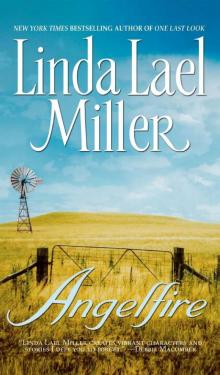 Angelfire
Angelfire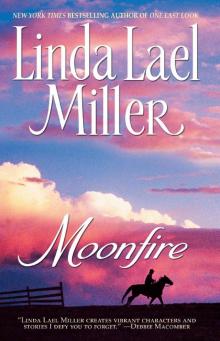 Moonfire
Moonfire The Yankee Widow
The Yankee Widow The Cowboy Way
The Cowboy Way Country Strong--A Novel
Country Strong--A Novel Forever and a Day
Forever and a Day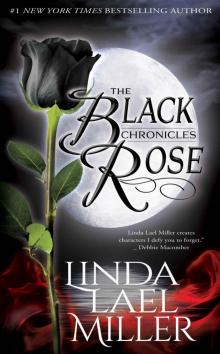 The Black Rose Chronicles
The Black Rose Chronicles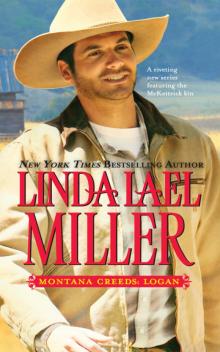 Montana Creeds: Logan
Montana Creeds: Logan My Darling Melissa
My Darling Melissa Skye
Skye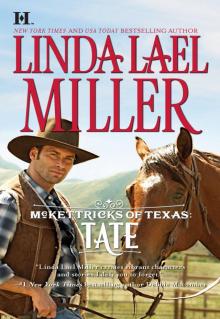 McKettricks of Texas: Tate
McKettricks of Texas: Tate Springwater Seasons
Springwater Seasons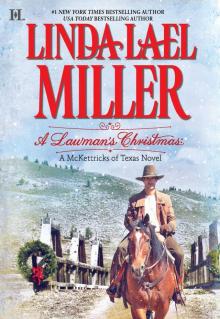 A Lawman's Christmas
A Lawman's Christmas Sierra's Homecoming
Sierra's Homecoming![Parable, Montana [4] Big Sky Summer Read online](http://i1.bookreadfree.com/i/03/22/parable_montana_4_big_sky_summer_preview.jpg) Parable, Montana [4] Big Sky Summer
Parable, Montana [4] Big Sky Summer One Last Weekend
One Last Weekend A Stone Creek Collection, Volume 2
A Stone Creek Collection, Volume 2 Tonight and Always
Tonight and Always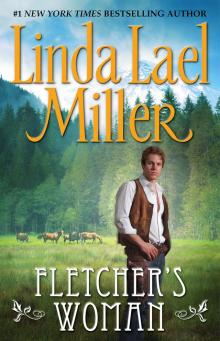 Fletcher's Woman
Fletcher's Woman A Snow Country Christmas
A Snow Country Christmas The Last Chance Cafe
The Last Chance Cafe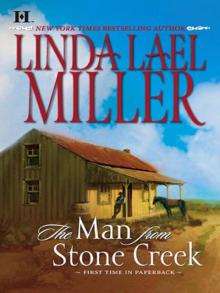 The Man from Stone Creek
The Man from Stone Creek Wanton Angel
Wanton Angel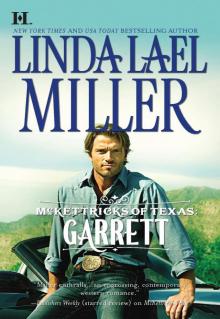 McKettricks of Texas: Garrett
McKettricks of Texas: Garrett Memory's Embrace
Memory's Embrace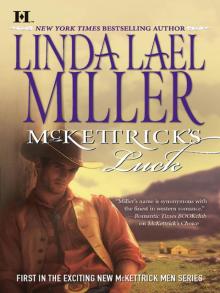 McKettrick's Luck
McKettrick's Luck Pirates
Pirates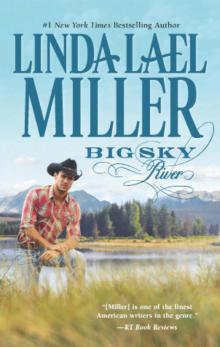 Big Sky River
Big Sky River Willow: A Novel (No Series)
Willow: A Novel (No Series) The McKettrick Legend: Sierra's HomecomingThe McKettrick Way (Hqn)
The McKettrick Legend: Sierra's HomecomingThe McKettrick Way (Hqn) Glory, Glory: Snowbound with the Bodyguard
Glory, Glory: Snowbound with the Bodyguard Two Brothers
Two Brothers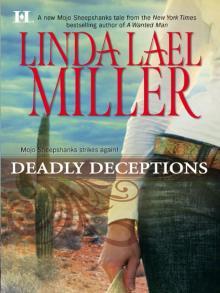 Deadly Deceptions
Deadly Deceptions Big Sky Secrets
Big Sky Secrets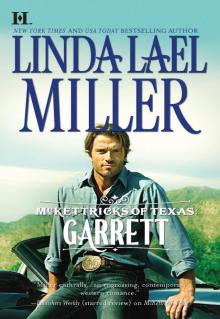 Garrett
Garrett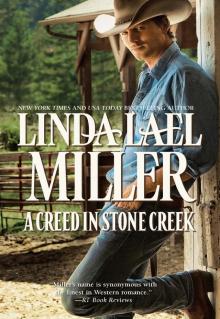 A Creed in Stone Creek
A Creed in Stone Creek Megan
Megan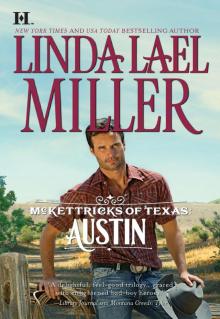 McKettricks of Texas: Austin
McKettricks of Texas: Austin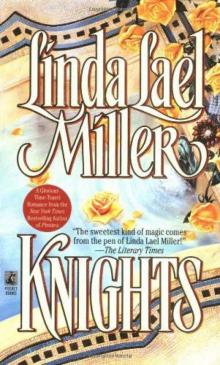 Knights
Knights High Country Bride
High Country Bride More Than Words Volume 4
More Than Words Volume 4 Glory, Glory
Glory, Glory Daring Moves
Daring Moves Lily and the Major
Lily and the Major Courting Susannah
Courting Susannah Banner O'Brien
Banner O'Brien Big Sky Mountain
Big Sky Mountain Linda Lael Miller Bundle
Linda Lael Miller Bundle McKettrick's Pride
McKettrick's Pride A Stone Creek Collection Volume 1
A Stone Creek Collection Volume 1 A Wanted Man
A Wanted Man Big Sky Country
Big Sky Country The McKettrick Legend
The McKettrick Legend Christy
Christy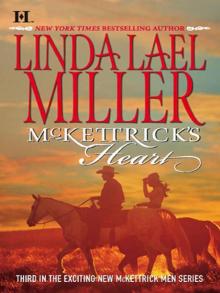 McKettrick's Heart
McKettrick's Heart Resurrection
Resurrection Arizona Heat
Arizona Heat Secondhand Bride
Secondhand Bride Snowflakes on the Sea
Snowflakes on the Sea Montana Creeds: Tyler
Montana Creeds: Tyler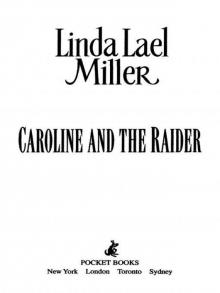 CAROLINE AND THE RAIDER
CAROLINE AND THE RAIDER A Proposal for Christmas: State SecretsThe Five Days of Christmas
A Proposal for Christmas: State SecretsThe Five Days of Christmas Yankee Wife
Yankee Wife Linda Lael Miller Montana Creeds Series Volume 1: Montana Creeds: LoganMontana Creeds: DylanMontana Creeds: Tyler
Linda Lael Miller Montana Creeds Series Volume 1: Montana Creeds: LoganMontana Creeds: DylanMontana Creeds: Tyler The Christmas Brides
The Christmas Brides McKettricks Bundle
McKettricks Bundle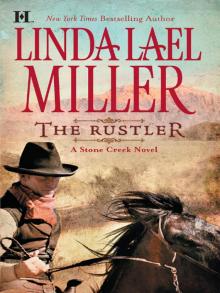 The Rustler
The Rustler Here and Then
Here and Then Only Forever
Only Forever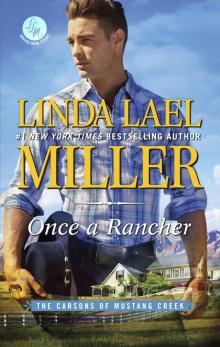 Once a Rancher
Once a Rancher The 24 Days of Christmas
The 24 Days of Christmas Big Sky Wedding
Big Sky Wedding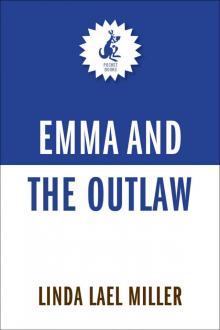 Emma and the Outlaw
Emma and the Outlaw Princess Annie
Princess Annie Wild About Harry
Wild About Harry That Other Katherine
That Other Katherine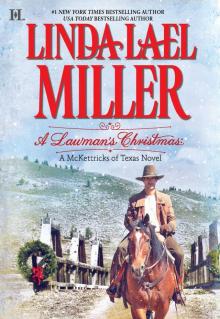 A Lawman's Christmas: A McKettricks of Texas Novel
A Lawman's Christmas: A McKettricks of Texas Novel Just Kate: His Only Wife (Bestselling Author Collection)
Just Kate: His Only Wife (Bestselling Author Collection)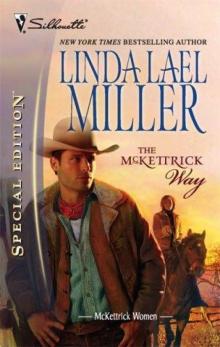 The McKettrick Way
The McKettrick Way Part of the Bargain
Part of the Bargain Taming Charlotte
Taming Charlotte Holiday in Stone Creek
Holiday in Stone Creek One Last Look
One Last Look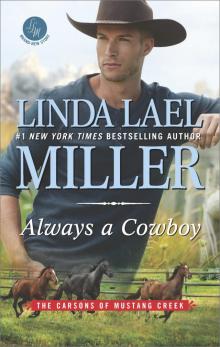 Always a Cowboy
Always a Cowboy Batteries Not Required
Batteries Not Required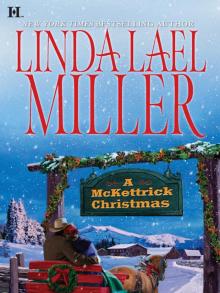 A McKettrick Christmas
A McKettrick Christmas For All Eternity
For All Eternity The Marriage Season
The Marriage Season Corbin's Fancy
Corbin's Fancy The Creed Legacy
The Creed Legacy Springwater Wedding
Springwater Wedding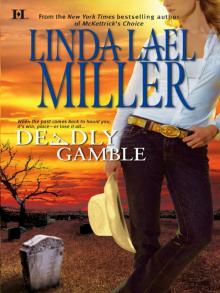 Deadly Gamble
Deadly Gamble Austin
Austin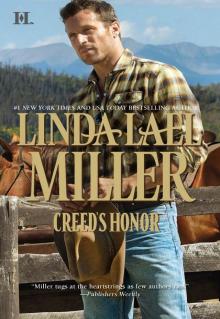 Creed's Honor
Creed's Honor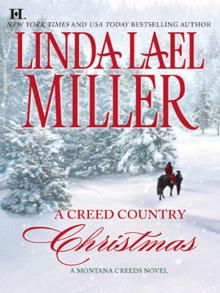 A Creed Country Christmas
A Creed Country Christmas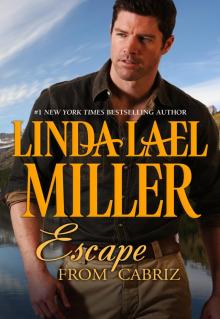 Escape from Cabriz
Escape from Cabriz There and Now
There and Now The Bridegroom
The Bridegroom State Secrets
State Secrets Bridget
Bridget